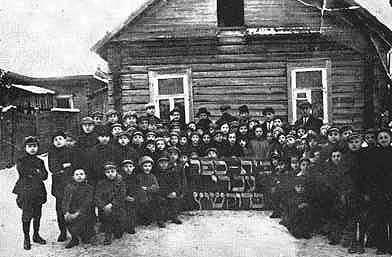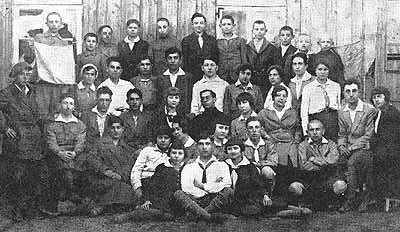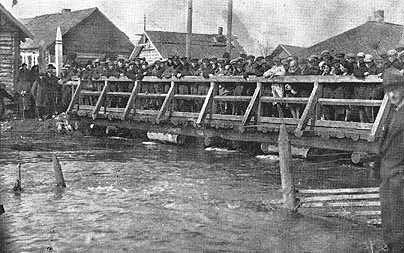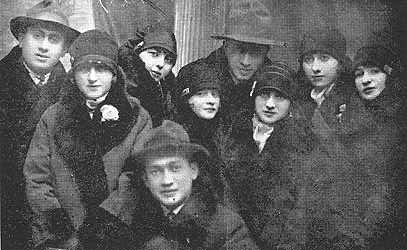
|
|
[Pages 18 - 46]



Songs, songs... "Maybe" - "The motherland" - "My soul desired" - "The dream" - Feelings and bliss. A place for the heart to overflow, between activity in the youth movement, a trip, a camp, pioneer training, the army and the anticipation of the "Aliya". Books - Bialik, Peretz, Mendalei, Marx, Mopassant, Rolan, "Flames", Everlasting Love", and Tolstoy. And there...? In Poland - Hatred and malicious plotting of the gentiles... No! We shall not overlook the little house of Agatha. She and her daughter are the "Sabath-goy" - and the water drawers. The symbol of poverty, distress and the moral deterioration of he country. For only a few pennies she milks the cows, extinguishes the candles on the Sabath, washes the floors, washes the laundry, brings water and much more... Did she remain a friend in times of holocaust and distress?

On the opposite side, what do we have? The house of Disha and her sons - gone to America.
Disha is going to America, the street is full of chatter... the neighbors are whispering. Is it so? Yes. Her husband has sent her the papers... At first she objects, refuses. No! She will not desert her sister Malka and her children. Leave the house, the quiet religious town and go off to the end of the world... Where they scorn "Yidishekeit". There is chaos and noise, automobiles and skyscrapers... However, she finally decides. The preparations lasted two years, for many are the papers and arrangements. She has to go to the American consul in Warsaw and fill out questionnaires. Warsaw is a city of con men - when they saw the small-town girl standing in front of them, they traded empty pieces of paper for her dollars, and sold her a brass ring instead of a gold one. That is not all. Down blankets and pillows have to be made. For this, Geese have to be raised, fattened; with the first snow, as the feathers whiten, they are slaughtered. All the neighbors help plucking. The women work 'till the early hours of the morning. Plucking, yakking, giggling and gossiping. True, the work was plenty, but in the end Disha can be proud of the size and weight of her bed clothes. Also, dry cheese has to be prepared, Gomulkes (a pastry) and hard cotton towels, since the townspeople do not use the city-folk soft towels. Much is the work. Two days before she leaves, Disha takes leave of the synagogue. Then she visits the graves of her relatives. She is all tears; and here comes the final moment. All who were there will remember it forever. All the relatives and neighbors gathered round the house and filled the street. Chaim Wallwel, the coachman, loads the huge packs on to the cart hitched to two horses. Disha kisses and caresses the walls of the house and parts with her friends and neighbors tearfully. The coachman hurries: The train will be missed! The paring is difficult. She kisses the ground, but at last she's put in the wagon and she's off.
"Happy are they that dwell in thy house..." (Psalms 84, 5) With dawn a voice rises from this house day after day. Father, may he rest in peace, Lazer-Hiles. "Psalms", D'...
His lips mutter the prayer while his eyes look out the window searching for a farmer in a wagon coming to sell linen or rye. Often one hears: "A psalm of David..." together with "Patchion Lyon..." For father was a harvest and linen tradesman. Hard working, agile and honest. Loved and accepted by all- including the neighboring peasants. And mother - always busy. Milking the cows, baking bread, cooking , cleaning, doing the washing, knitting and sewing. Sabbath nights and holidays...
Youth. When everything is light and the blackest - is white. When the snow covers the windows, flowers of grace, a sun-ray of gilt. Everything full of light and warmth even the snow - even the frost. Arms folded, father walks back and forth telling an ancient legend from a time long past. A Hanukkah lamp glitters on the table - Holy! The candles flicker. Silence. Once there were a mother and her seven daughters. They stood erect, they would not surrender to evil! They were slaughtered before her. Mathityahu and his five sons, heroes, "The Maccabees", led the rebellion! A lesson for generations to come. Facing the many - the strong, stood the few, fighting, avenging winning. He tells of a small oil vase among the ruins of the house of God. Of Judas Maccabaeus, hero, bringing freedom and liberty to a tortured people. Imaginings and secrets. To a child's eye it is a short distance from reality to legend.
What is the value of regular days when compared to the holidays? Only yesterday we celebrated Purim, he happy festivities, with it's gift sending, "Mahn-ears" and noisemakers - and already we get ready for Passover. So much to do. First, the kirch has to be checked, home made."Naliwax" kosher, made to perfection. We Steep wooden barrels in the river to make them kosher to hold water during Passover. A sack of "guarded" wheat is brought to the mill, and is ground into "matzah" flower under strict observation. The neighbors open a matzah bakery together - (Padrad). They bring new boards and planks; after being cleaned the new tables are ready for the kneading of the dough. Everyone helps: Fathers, sons, daughters, all in white volunteer for work. The women roll the dough until it's thin and fine, the youngsters make the holes with metal wheels, and the children pour the flower and the water.... The strongest of the men make and knead the dough and the most responsible put it in the oven. Like a commander in the front lines stands the baker near the oven. His face glistening in the heat shining with joy and perspiration. He and no one else, handles the work. He is in charge.
The first "matzahs" are taken out of the oven and are put in a basket on a white cloth. The matzahs - thin, round, fragile and fragrant - pass from hand to hand. First to taste are the children, for they can wait no longer, and then the rest. They taste and enjoy. They praise,they complement,they extol... So thin, so white, reviving! Taste of heaven! Here and there one hears blessings! "Blessed be he who gives us life...."
At home a "Kosher for Passover" corner is readied for the matzahs. The crate is covered with snowy cloths all around. The suspense rises... Everyone expects the porter impatiently. From afar one can here the joking of Asar Zecharovitch about the towns rich, about their pretty daughters, fragile, spoiled...
Make way! Here he comes- and the basket of matzahs is already at home. An aromatic fragrance spreads across the room. Feelings of suspense, joy and holiness. In my memory of then... these moments...are like "the revelation on mount Sinai".
Done with the matzahs, we begin the work at the house. First, the brasswear is whitened and made Kosher: kettles, pots, pans, samovars and other utensils. After this the walls are whitewashed and then the cleaning, the scrubbing, the washing and the "mess"... At this time the tailor and shoemaker arrive to make new clothes and shoes for Passover.
The snow has already begun to melt and warm winds blow from the south. Dogs,cats and other animals loudly announce their presence and begin looking for a mate. Here and there a cow gives birth to a calf and the goat spawns kids... Outside, the rivers are overflowing. Many people gather on the Berezina bridge to watch the water spewing and angrily sweeping logs, branches, roots and planks. The people stand there with fear in their hearts, arguing: will the bridge hold? The older ones tell stories: Once, a bridge was destroyed by the flow, with a mill and many houses. Some say it was before the great fire; others say after...
Already the holiday is near. Everything spotless, clean and shiny. The Passover dishes are taken down from the attic. Everything gives off the aroma of the holiday. As the evening dawns, a last check is made: Father passes from room to room with a feather and a candle picking the crumbs of bread put there before. The next day the "hametz" is sold to a gentile and everything is Kosher for Passover.
How I long to relive these precious hours before the "Seder", to feel the Solemnity in every corner, the holiness and light.
To be again in the shiny house, near mother, radiant in her snowy shawl...Mother...!
The table is set- matzahs, wine, fish. Everyone sitting ready for the "Seder". Father, like a king- on a high chair among pillows. The children, in their new clothes- Does a deeper joy exist? The Passover holidays which are also the end of the days in the "Heder".
"What is different"? Here he is! I see him in my mind... Elijah, the prophet, walking across the room, sipping from a cup.
Oh story? Diminishing memories! Forced by them, was I! Flaming poetry coerced from my loins...all to no ado. Passover at home- that is childhood, the age of youth... Days of gold and glory.
Here is the echo of the Haggada stories: About the billy goat, a stick, wildcat and water.
I will run towards my sweet kids, press them to my heart... and the echo... continuous... the next year in Jerusalem!
Youth. The heart warm and wide. The blood racing through the veins.
Spring. "He and she" whispers of love, a first kiss. The shudder of bodies. Shameful pleasure. The hand on the hair.
Everything is a fire! Everything is a storm! Quickly! Rebellion! Charge every obstacle!
With dawn, belief and knowledge. Conversation. Song and dance for supper.
The winter and autumn. Schwistapfoli's forest permeates strongly. The lilacs in the alleys intoxicates in the evenings. The smell of roses and Tofuls diffuses through the air. The wooden bench at the corner near the brick house- "The Princes' Palace"- what vigor, how good the people are. In the streets, in the houses. What attraction to the youth movement meeting place, the regiment, the group. How sweet and beloved are the friends.
Is it possible? Are the winds warm in autumn as well? The falling rain mixed with the autumn snow, leaving thick mud on the roads, looks more clear... More beautiful. All this gathers the thoughts, collects the dreams... In winter, how white the snow is - how crisp the air! The ice - a crystal miror. How good to skate. Oh life, how I love thee!
In the barn the gang sits on the hay, singing. The feelings flow, nostalgia, warmth and love all around. She sits near him - so close... here she is, whole, the sight of her, her voice, the light of her eyes, her body - her soul. Deep in the heart, the singing goes on. The Jorden river flows, it's pure waters whispering secrets. Oh, is our secret revealed as well? Do they know about the hidden yeearning , the chaste, modest, relentless feeling?
"You are my Kinnereth". The Jordan river, the Kinnereth... love... the song goes on "Listen, how sings the spring! The song of rebels, the song of freedon". May it go on forever, boundless. Many days and nights, to the end of all generations - forever and ever. Slowly, the singing dies out and a conversation about wealth and happinness developes. "Life, it's sorrows and worth" "The sons' rebellion" "Youth and old age"
I shall never forget you, the "Rabbi" and the "Heder" (religious elementary school). I was but a child, but the "heder" memories are deeply imbedded in me. I was five-years-old when the teacher and his son came to father to speak about my eldest brother learning in his "heder". My brother would not go without me so I joined him. The master took me on his back and brought me to the "heder" When he got back to the "heder" he put me down. I stood at the doorstep, embarrassed and shy. I took in the "heder" with my eyes. Long, wide tables, and to them, sat little children on wooden benches. At the corner of one of the tables, sat the master with one of the boys near an open book, pointing with his finger and a belt nearby. "Say 'Kammatz' A, 'Kammatz' B, well? - Go on!" The boy is having difficulties. It seems he's crying. Is this it? I cannot remember how long I stood there with my finger in my mouth... A kid winked at me from one of the tables. I came closer slowly, but the rabbi scolded him. Under the table I saw some kids playing with buttons, I joined in. Finally, it was my turn. Teh rabbi sat me on his knees, near the open book, and began showing me the first letters. It seemed I was sitting on a hot pan.. I tried not to cry - it would not look proper for a five-year-old to cry. I was released with an affectionate pinch. From then on, everyday I had my turn with the rabbi. I received many affectionate pinches, but once in a while my ear would be pulled... a sign to be careful, so that I should know I was mistaken with a phrase or a tune. The rabbi's barometer. Nevertheless, I loved the Alphabeth. Later, the Torah stories, sung... The walking home with a lantern in hand... The fence was broken in the days of youth and triviality. Suddenly, at dawn, for the first time in the "heder". Hebrew and Torah - Adam and Eve, the creation of the world, the shrewness of the snake... Cain and Able, Sodom and Gommorra. Is it all true? Maybe a lie and a falsehood? Oh, if I could only shed my burdens - as a child of then, straighten my back, take off my shoes, without any obligations, worries or promisses. I'd run back to the rabbi, to the "heder". Most probably, scorn the modern lecture halls, the lavish schools - Nifty teachers smile to themselves, luxurious colleges... but I shall not be convinced! Happy is the man who aquired knowledge and wisdom in that tiny, poverty-stricken "heder".
A small and modest house. A large family resides here. It is a wise family having an understanding of contemporary times, and this is why it is the meeting point of the "Shomer-Hatzair" Many of the young come here to be educated, to live together. The house is busy with youngsters at all hours of the day: Girls thrown out of the Polish school for belonging to the "Shomer Hatzair" will find condolences here; when the time for "Pioneer training" comes, here is where the strategey for convincing the parents is formed. John Doe has to make Aliyah but has no money - here is where one looks for solutions. A trade must be learned. How? Which? Where? Here one talks about it. Someone has to buy material for clothing, shoes, a sweater, a dress; to crochet a shirt - here is where they'll come for a final decision. You've read a book and you would like to talk about it - here is where you'll find a listening ear. If the kids are not at home, you can talk with "mother" until they arrive. A good and kind woman. The boys - all witty, with acute minds and tongues... and the girls - all graceful and charming... You would like to know the news of the town - here is where to come. Just gossip...? Everything is talked about here. What happened yesterday at the youth movement meeting? Who's in love with whom? Who went to vilna and brought "Saccharin" Who was met last night? What happened in the Polish school? Who's to be married? What did Asar Zacharovitch say? Again about the argument of the two rabbis. A new teacher has come to the "Tarbut" school . Some new books at the public library. Something is wrong at the bank. Last night, the fire- fighters' band crossed the border into Russia. Who are the couples that will empty the Jewish National Fund donation boxes tomorrow? Again about the traditional fire-fighters' parade every Sunday in their shiny brass hats, the trumpets and the band. There is a movie showing at the "Dam-Ludowi". Have you heard? There is a radio with earphones already in Dokshitz - It's at the nearby café, they're actually talking... More youngsters crossed the border. Yesterday, we drank "Quas" at Mulai-Kugel, good "Quas". There was a fight with the communists. ÅRabbi Glinkin spoke at the synagogue against the youth movement members for desecrating Passover..."Firalaier Lat'kes"... Soon there'll be a "tea party". The ones training at night to ready themselves for the army transferred wood from the lord's house to the pauper's home. Drunken gentiles broke the windows of Jewish houses but received a beating. Shlomo and Israel received certificates to make Aliyah to Israel, the parting at the bridge. That loony happy guy said... The Jewish National Fund council in Dokshitz is raising a show. A few Jews were arrested for commerce on the border. The communists spread more propaganda. She's beautiful...
Many shall remember the small warm house, a heater, a couch, a table, an oil lamp, warmth, simplicity and modesty. Opposed to substance - the glory of the spirit... the life and the soul of every flesh and blood. Here, the heart shall open, a story is told by every man - young or old.
Miserable, bitter, unlucky in love, failing at exams, a sadness of the heart? Distress at home, unemployment, destitute or simply...in love... All in need. Sharing - some in joy, some in failure and misery. Here is that small house! Morning, noon, evening, a joy in the heart... A light shining in the window.
Can the pain be encompassed? Will the world ever understand the immenseness of the holocaust, the profoundness of the sorrow?
In the town: streets, alleys, squares, markets, synagogues and schools. Children, boys, women, grown-ups, elderly - everything is gone to dust.
Only stories are left, memories, nostalgia and a heart torn in infinite grief.
|
|
JewishGen, Inc. makes no representations regarding the accuracy of
the translation. The reader may wish to refer to the original material
for verification.
JewishGen is not responsible for inaccuracies or omissions in the original work and cannot rewrite or edit the text to correct inaccuracies and/or omissions.
Our mission is to produce a translation of the original work and we cannot verify the accuracy of statements or alter facts cited.
 Dokshitz, Belarus
Dokshitz, Belarus
 Yizkor Book Project
Yizkor Book Project
 JewishGen Home Page
JewishGen Home Page
Copyright © 1999-2026 by JewishGen, Inc.
Updated 19 Feb 2003 by LA